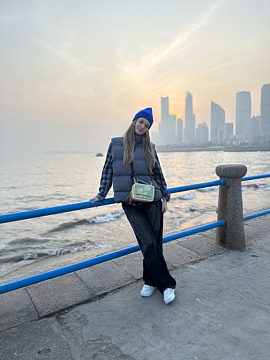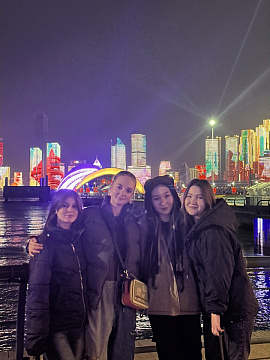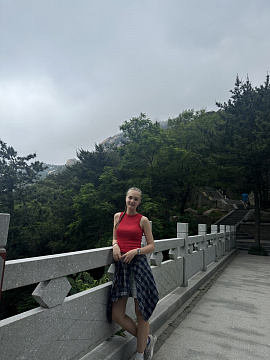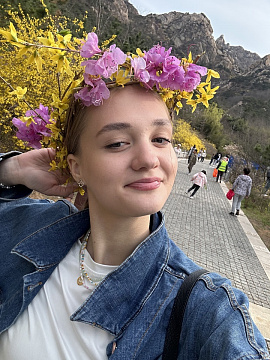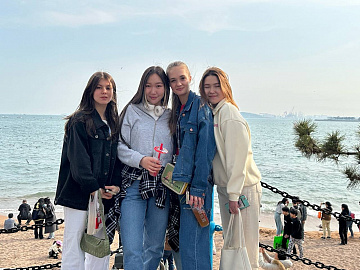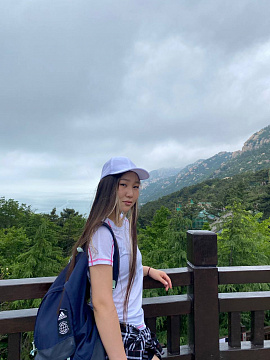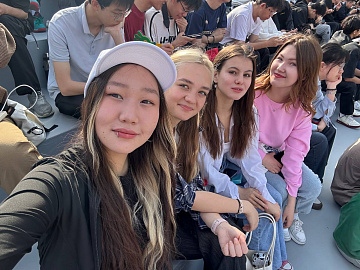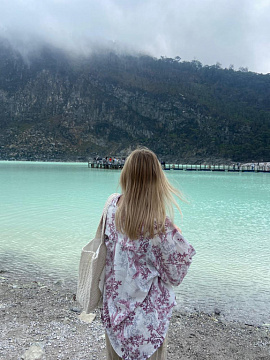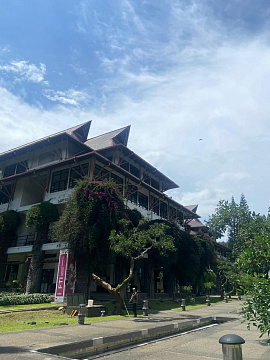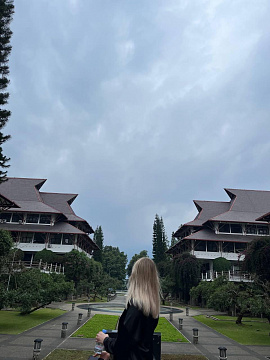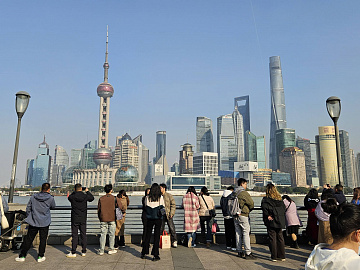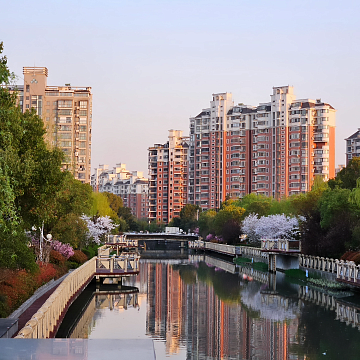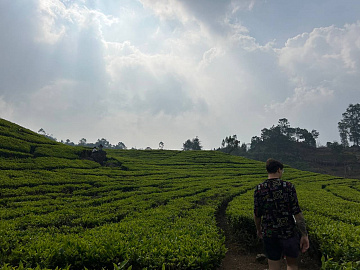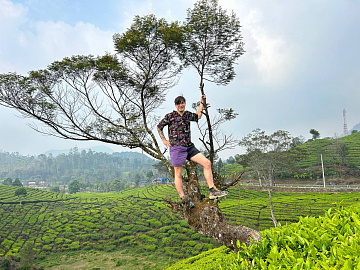
The impressions from the internship were only positive. When I first arrived, it was a little difficult to adapt to a new country, in new conditions, but it passed quickly. Most of all, I liked to attend couples, as each teacher had his own individual approach to explain a new topic. It was great to do homework on a special electronic platform, we wrote hieroglyphs, made sentences, wrote essays, etc. I think that thanks to this trip, my Chinese has improved significantly, which makes me happy. In addition to the educational process, I and the guys with whom we came actively studied the city and its sights. We met many wonderful people who are also studying in China, and it was great to communicate and share our experiences.
In conclusion, I would like to thank INRTU and Baikal School of BRICS in particular for the opportunity to gain this limitless experience and a whole body of knowledge, which I am sure will be useful to me in the future.
What difficulties did you have at the stages of preparation for the internship? What tips and recommendations can you give to future participants of the academic mobility program?
The issues were mainly related to currency exchange, but everything was resolved quickly enough. We made Gazprombank UnionPay cards, from which we withdrew money at any ATM in China and replenished Alipay, WeChat. You can pay with a Gazprombank card in large stores and supermarkets and withdraw money from it, that's probably all. Upon arrival in China, you can easily get a Chinese bank card.
Describe the process of obtaining a visa. Your advice for future participants of the academic mobility program.
It is not difficult to get an X2 visa: collect a small number of documents, fill out a questionnaire and come to the embassy in our city. We contacted the mobility department for all questions, at this stage they almost did not arise.
What difficulties did you encounter upon arrival at the host foreign organization? Your advice to future participants of the academic mobility program.
There were the least difficulties at this stage. INRTU International Exchange Office was always in touch with us, and the host university turned out to be very hospitable. Upon arrival in Qingdao, we were greeted by volunteers who speak Russian and Chinese. Volunteers helped to sort out the hostel, get bank cards, a Chinese SIM card, in general, with any, even small issues.
Specify your expenses related to participation in an internship abroad (visa costs, cost of flight / travel to the place of internship, registration fees / taxes / deposits in the host organization, policy / medical services, if used, public transport, meals, accommodation. Your tips for cutting costs.
The expenses were all justified and in the end came out no more than we expected. The visa cost 2500r. We bought plane tickets to Beijing a few months before departure and this was our mistake, because the flight is daily and the closer to the flight, the cheaper. So we bought tickets from Irkutsk to Beijing for 21,000 rubles, and back for 14,000 rubles (we bought 2 weeks before departure). The Beijing-Qingdao high-speed train cost us 350 yuan one way. The hostel cost 600 yuan per month, they paid immediately for the entire period. There is also a one-time deposit of 1000 yuan and a registration fee of 400 yuan. The campus card to eat in the cafeteria is 20 yuan. You can eat in the dining room for 35 yuan a day. We traveled around the city by subway – 5 yuan per trip. They also spent money on laundry in the dorm – 5 yuan at a time. On average, it took from 2,000 to 2,500 yuan per month to live a comfortable life.

- there are two people living in a room;
- each room has its own toilet and shower;
- nice, well-equipped kitchen;
- there are free classrooms on the ground floor for those who want to study outside of school hours;
- reception on the ground floor, wh ere you can always ask questions, and much more.
There is also a promenade near the campus, where we went in our free time. The embankment is improved for comfortable walks.
Academically, the internship took me to a higher level in learning Chinese. Also, being in an environment where students study the language with great zeal and interest, I became more and more motivated to learn Chinese more deeply.
Personally, this trip gave me a lot: a lot of new acquaintances, the opportunity to travel, do my favorite sport in another country, which also influenced my volleyball skills. Qingdao is an incredible city that has literally everything in it. I am glad that our university has started cooperation with UPC, and I hope that many more students will be able to go on an internship at UPC.
What difficulties did you have at the stages of preparation for the internship? What tips and recommendations can you give to future participants of the academic mobility program?
At the stages of preparation for the internship, difficulties arose only with filling out a questionnaire on the UPC website, the INRTU mobility department helped solve all the questions. First of all, I advise you not to hesitate to ask questions to the mobility department – this way you will make fewer mistakes and come to the desired result faster
Describe the process of obtaining a visa. Your advice for future participants of the academic mobility program.
The process of obtaining a visa was not something unrealistically difficult. A big plus is that there is a Chinese consulate in our city. In the process of obtaining a visa, we filled out a questionnaire, collected the necessary documents (there are few of them), went to the consulate and paid the money. A week later, the visa was already in our hands. Therefore, the process of obtaining a visa is not at all complicated, as many may think. I advise you not to be scared ahead of time.
What difficulties did you encounter upon arrival at the host foreign organization? Your advice to future participants of the academic mobility program.
There were no special difficulties upon arrival in Qingdao, as we were met by a Russian-speaking volunteer who speaks fluent Chinese. Throughout his time in China, he helped us. Also, a big plus was that we had pre-installed apps for ourselves and our loved ones in Russia that are available in China (WeChat, VKontakte). On the first day, volunteers also helped to make SIM cards, bank cards and campus cards. I advise future participants of the academic mobility program to install WeChat, since upon arrival in China you will be able to contact the university only through it by catching Wi-Fi.
Specify your expenses related to participation in an internship abroad (visa costs, cost of flight / travel to the place of internship, registration fees / taxes / deposits in the host organization, policy / medical services, if used, public transport, meals, accommodation. Your tips for cutting costs.
We paid 2,500 rubles for the visa, 22,000 rubles for the Irkutsk-Beijing flight, and 13,000 rubles in the opposite direction. First of all, I advise you not to take tickets earlier than two weeks in advance, as tickets become cheaper over time. The one-way train left a little over 360 yuan. On the first day of checking into the hostel, we left a deposit of 1,000 yuan, 400 yuan for medical insurance. You need to pay for the hostel immediately for the entire period of stay in it, we paid 2,400 yuan for four months. We took the subway, the cost did not exceed 6 yuan per trip. It took about 50 yuan a day to eat, since we didn't eat only in the cafeteria, a lot of fruits, drinks and ready meals are sold on campus.
You will be able to reduce costs if you eat in the dining room – about 25-30 yuan will be released per day

A valuable experience that provides an opportunity to learn about the cultures of different countries and communicate with people from other countries.
What difficulties did you have at the stages of preparation for the internship? What tips and recommendations can you give to future participants of the academic mobility program?
Preparing the documents is quite a complicated process, it's better to learn about the country and its aspects before arriving.
Describe the process of obtaining a visa. Your advice for future participants of the academic mobility program.
To obtain a visa, it was necessary to start preparing six months before the intended semester. For instance, if the semester starts in February, preparation should begin in September. The required documents included those certified by the dean's office, the department, a medical certificate, a COVID-19 certificate, a certificate of no criminal record, writing a motivation and recommendation letter, a bank statement, and health insurance.
What difficulties did you encounter upon arrival at the host foreign organization? Your advice to future participants of the academic mobility program.
Most of the difficulties arose because I had no prior knowledge of the country I was going to, nor its features. Therefore, I had to adapt to everything on the go. Additionally, the process of converting the temporary visa to a long-term one after arrival was quite lengthy.
Specify your expenses related to participation in an internship abroad (visa costs, cost of flight / travel to the place of internship, registration fees / taxes / deposits in the host organization, policy / medical services, if used, public transport, meals, accommodation. Your tips for cutting costs.
Visa expenses were about 17,000 rubles before arrival, and an additional 9-10,000 rubles after arrival. Health insurance cost about 28,000 rubles, along with money deposited in the bank account. Tickets: Irkutsk – Bangkok = 27,000 rubles, Bangkok – Jakarta = 13,000 rubles, Jakarta – Bandung by bus = 1,200 rubles. There were minor deposits for accommodation upon arrival; pre-arrival payment for 5 months of accommodation was 50,000 rubles. In Bandung, the main mode of transport was a motorcycle taxi – approximately 40 rubles per trip. I mostly ordered food or ate at cafes, costing around 1,000-1,200 rubles per day.

There are a lot of positive impression, I liked the culture and architecture, all the people are pleasant and responsive. I passed the HSK 3 Chinese language exam and generally improved my speaking skills in Chinese. The internship was useful for me in everything, according to the included training program, my subjects are successfully closed, and I am glad that I studied these subjects abroad. I learned a different approach to education in China. As for me, it became clear to me that I want to connect my life with China and the Chinese language.
What difficulties did you have at the stages of preparation for the internship? What tips and recommendations can you give to future participants of the academic mobility program?
In general, there were no difficulties. I can advise you to reformat all Word documents to PDF, so that your documents will remain in the form you wanted when printing.
Describe the process of obtaining a visa. Your advice for future participants of the academic mobility program.
There was nothing difficult in obtaining a visa, you need to fill out a questionnaire, print it out and come to the embassy with a Russian passport and a foreign passport. There is no person at the embassy who can tell you something in Russian, but there are 3 windows, 2 of which are for applying for a visa and 1 for receiving. It is worth contacting one of the two windows on a first-come, first-served basis. Hand over the printed application form and passport to the embassy employee at the application window. Take into account the days and opening hours of the embassy. After handing over the documents, information about the payment of the application is indicated at the windows, the bank and the bank's address will be written there. The application is considered within 7 days, and it must be paid no later than the end date of the application (it is better to pay immediately).
What difficulties did you encounter upon arrival at the host foreign organization? Your advice to future participants of the academic mobility program.
The peculiarity was that the applications and search engines that we are familiar with in China do not work without a VPN. For example, Google, Google Maps and Telegram. WhatsApp and Viber can work without a VPN, but with a delay and without the possibility of delivering media files. Everyone should have WeChat, a Chinese messenger and a VPN (for example, Planet VPN is not the best, but after several attempts to connect it turned out). Alipay and WeChat Pay are payment systems in China. It's easy to open an Alipay account, just go through verification. To use WeChat Pay, you must already have a Bank of China card. You can pay in cash and with a Unionpay card. You can connect MasterCard and VISA cards to Alipay. Next, in Alipay, you find your balance and click "Recharge".
Specify your expenses related to participation in an internship abroad (visa costs, cost of flight / travel to the place of internship, registration fees / taxes / deposits in the host organization, policy / medical services, if used, public transport, meals, accommodation. Your tips for cutting costs.
• Visa costs – 2500 rubles.
• Flight about 36.000 rubles Irkutsk – Beijing (round trip) + about 16.000 rubles. Beijing – Shanghai (round trip).
• The institute provided information on medical insurance in an email, I paid 400 yuan for 6 months.
• Prices for public transport may depend on the city. Bus fare is 2 yuan (payment via Alipay or coins is exactly 2 yuan, since the machine does not give change). Metro – 6 yuan (on average).
• No additional contributions were required. We lived in a dormitory at the institute in a room for four with a cost of 30 yuan a day. On average, it took up to 500 yuan to eat for a week.
• I can advise you to keep track of your expenses and calculate them at the end of the week.

The impressions from the internship are extremely positive, a huge amount of new and useful information. I think this training, personally, gave me motivation to become a more highly qualified specialist in my field. I believe that the experience gained during the internship will help me in my further studies.
What difficulties did you have during the preparation stages for the internship? What tips and recommendations can you give to future participants of the academic mobility program?
There were not many difficulties in preparing for the internship, the main problem was with obtaining a foreign passport, constant postponements of issuance dates, you may not be in time for the start of training, so it's better to start preparing in advance.
Describe the visa application process. Your advice for future participants of the academic mobility program.
To study in Indonesia, you need two types of visa, the first, which is issued for your flight to the country, and the second is issued upon arrival. For the first visa, you need to send documents and funds (at the time of our training, about 18,000 rubles), for the second, the documents requested by the immigration office are collected, you have a month to collect documents, but in fact everything is processed in two weeks.
What difficulties did you have upon arrival at the host foreign organization? Your advice to future participants of the academic mobility program.
There should be no problems upon arrival, as your curators explain everything thoroughly and help with all issues. I had a little problem getting a document about my place of residence, since the hostel owner did not know English and it was difficult to explain what I specifically needed, but after a translator and some time we understood each other. Based on this, you need to be ready to communicate in Indonesian, because not everyone knows English.
Specify your expenses related to participation in an internship abroad (visa costs, cost of flight / travel to the place of internship, registration fees/ taxes/ deposits in the host organization, policy / medical services, if used, public transport, meals, accommodation. Your tips for cutting costs.
Before leaving, I paid 18 thousand rubles for a visa, after arriving I paid for ITAS (residence permit for 6 months) 10 thousand. The insurance came out at 29 thousand rubles. The cheapest tickets there came out at 41 thousand. I also paid about 29 thousand for the accommodation. Tickets from Jakarta to Bandung cost about 1200-1500 rubles. It took me about 100 thousand to live. And the tickets went back to 40 thousand.

